Baptist Union Council: November 2019
How Baptist ministerial formation is funded was a major topic at the latest Baptist Union Council gathering, which took place at the Hayes Conference Centre in Swanwick, Derbyshire (6-7 November).
Changes to the way that we enable collaborative leadership and implementation nationally were also explored as part of our ongoing discussions about the role of the Baptist Steering Group.
Worship was led by Steve Tinning, associate minister of Leigh Road Baptist Church in Essex. Steve also organised a Pecha Kucha presentation for the Wednesday evening, in which eight people took part. Pecha Kucha is a storytelling format, where a presenter shows 20 slides for 20 seconds of commentary each.

Scroll down for the following reports:
-
Funding ministerial formation
-
Composition of the Baptist Steering Group
-
New churches and closures
-
Baptists Together Key Roles Nominations Team
-
Finance
-
Churches not paying their subscriptions
-
Communications workshop
-
Assembly feedback
-
Ministerial recognition rules
-
Register of Nationally Accredited Church Workers
-
Facebook live
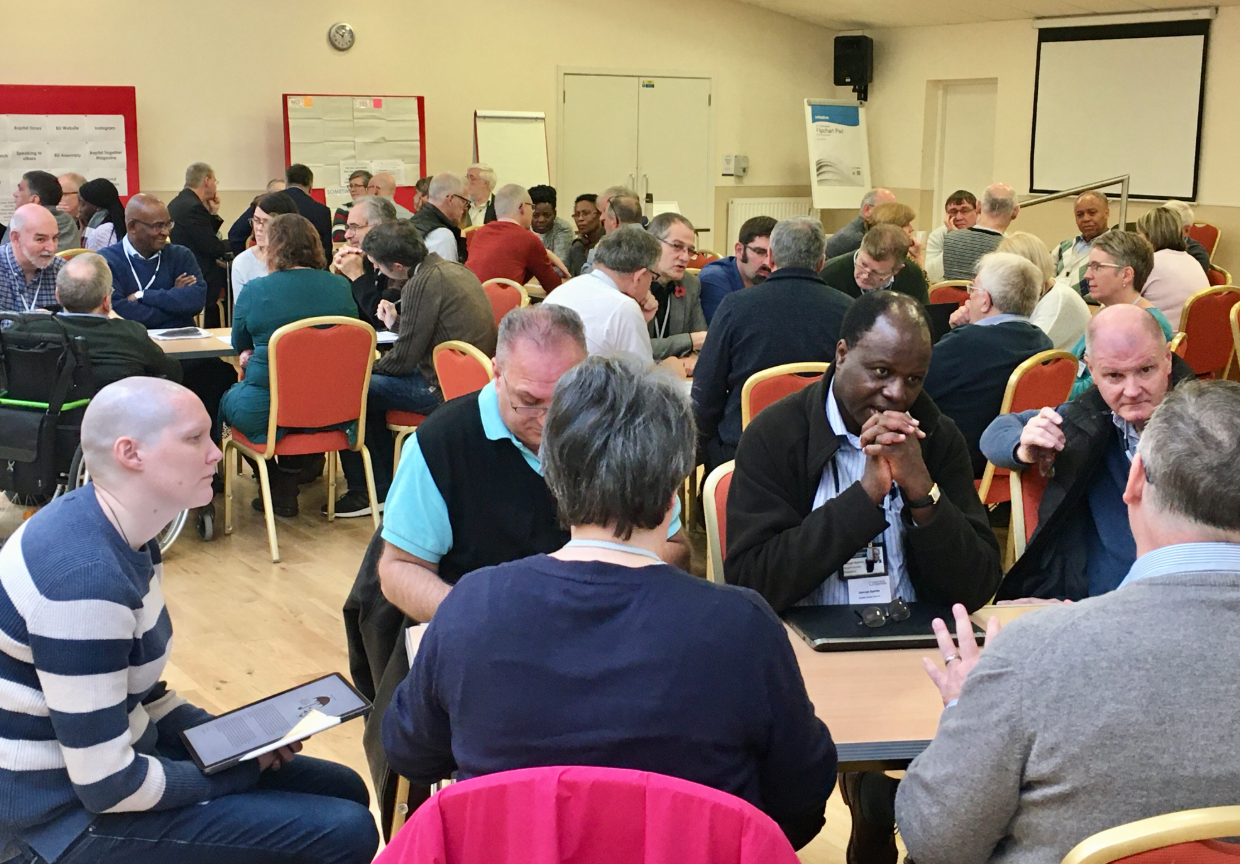
Funding ministerial formation
Two sessions at this Council were devoted to the formation of Baptist ministers – and how we might explore funding it.
The first session attempted to give a picture of where we are now, and was led by Tim Fergusson, the recently appointed Ministerial Development Advisor. In the first few weeks of his post Tim has visited our Baptist colleges.
He shared several observations:
Our Baptist colleges have a ‘curious’ position in Baptists Together: we rely on them to train the people who lead our churches and other forms of ministry such as chaplaincy and pioneering; we ask them to be flexible to make training accessible to a wide range of people; however, we don’t fund them, apart from a Home Mission contribution of £128,000, which is distributed as bursary funding to students by the Colleges.
Our colleges are offering a huge breadth of training and pathways for people who have sensed a call to ministry. Gone are the days of the one-size-fits-all, college-based pastor-teacher training, ‘even if that myth persists’. The majority of students opt for training within a church or mission-based context, and nearly half are working with an experienced minister
Nevertheless, it’s unlikely that our colleges can provide training that specifically meets each context a minister may encounter. They are attempting to embed foundational theological skills for whatever context the students will be in.
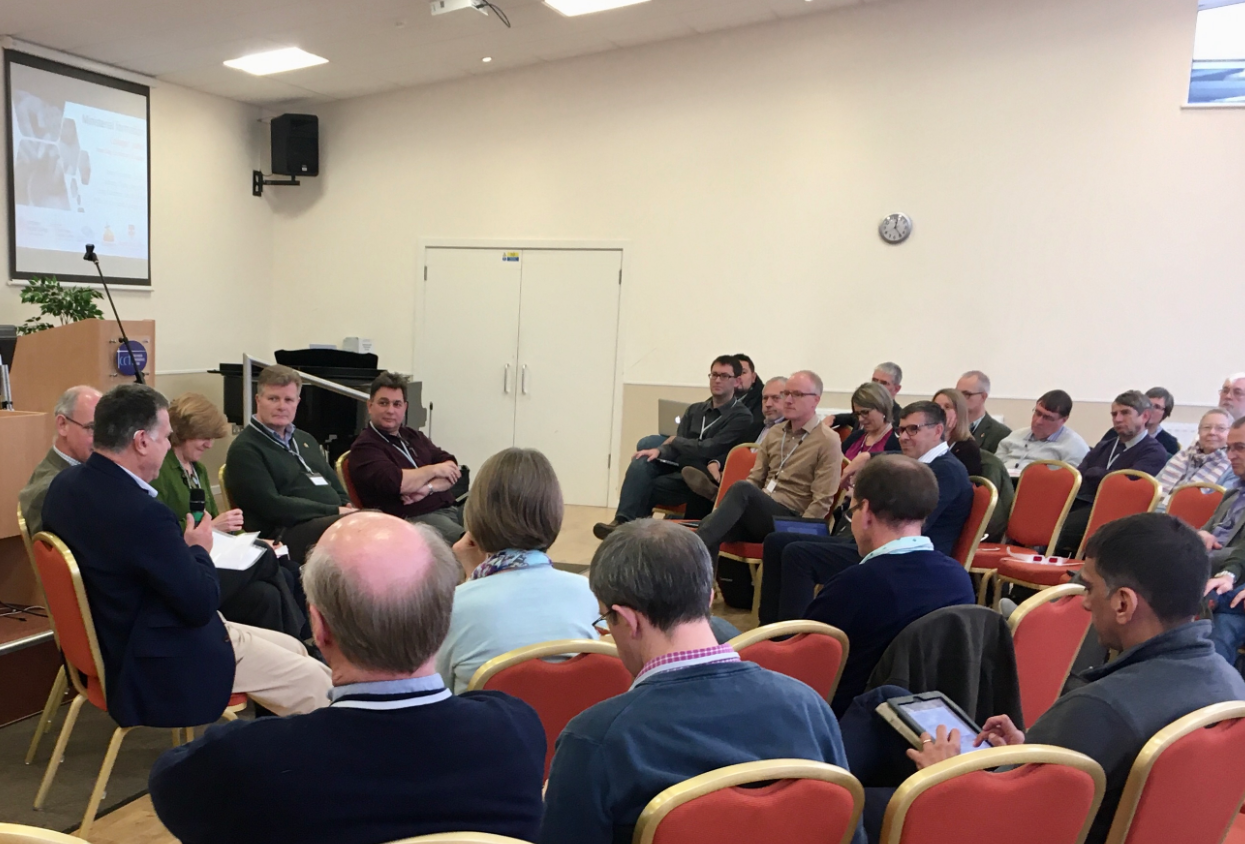 A number of these observations were confirmed in a panel discussion chaired by Jane Day (Centenary Enabler) involving college representatives, including Steve Finamore (Bristol Baptist College), Anthony Clarke (Regent’s Park College), Philip McCormack (Spurgeon’s College) and Craig Gardiner (South Wales Baptist College). They all spoke of the increasingly flexible nature of the training they provide.
A number of these observations were confirmed in a panel discussion chaired by Jane Day (Centenary Enabler) involving college representatives, including Steve Finamore (Bristol Baptist College), Anthony Clarke (Regent’s Park College), Philip McCormack (Spurgeon’s College) and Craig Gardiner (South Wales Baptist College). They all spoke of the increasingly flexible nature of the training they provide.
Tim said that the whole Baptist family should accept responsibility for formation, a point underlined by Richard Wilson, Support Services Team Leader in the second session. Richard explained there are three ‘troubling’ gaps in our training system. The first concerns supply and demand. As recently as five years ago there were two ministers in settlement for every church actively looking. However, the ratio of ministers in settlement to churches actively looking at each meeting of the settlement team has halved, which means there are often churches who are unable to receive nominations as there are not enough ministers available.
The number of retirements is higher than those joining the accredited list, and, factoring in other reasons for departure, there is a net loss of around 25 ministers each year. ‘I believe in the value of accredited ministry in driving our churches forward,’ said Richard, ‘and this trend really worries me.’ Currently there are around 120 people training for Baptist ministry, and we actually need between 180 and 200. How do we inspire more people to consider Baptist ministerial formation?
A key issue is finance, which accounts for another of the troubling gaps. A typical student – such as one exists given the flexibility of courses and pathways available – needs to find £15,000 living costs per year, on top of the £9,000 fees. Some students bridge the gap through their own savings or a supportive spouse, others are supported by churches, but in ‘a somewhat competitive market our offer is not the most attractive,’ Richard said, explaining that denominations such as the Anglicans and Methodists are ‘investing significantly in raising up their next generation of leaders’. As a result, young people from Baptist churches are choosing to train elsewhere.
The session also highlighted the financial costs involved for our colleges. Colleges broadly spend twice as much to deliver the training as what they bring in from each student. A number of our colleges are running at a loss, though all bridge the funding gap in varying degrees. The cost of delivering courses is rising.
Council members were told that the scale of the challenge is ‘as big as the pension crisis.’ In order to raise up godly leaders for the present and the future, we need to respond in similar way, by seeking to find ‘a family solution.’
Members were asked to commission a working party to urgently investigate options and make proposals.
One member suggested that we shouldn’t over emphasise the financial issue over finding the right people. Ministries Team Leader Andy Hughes responded that we need both the people to train for ministry and the resources to support them, it was not a case of one or the other. Treasurer John Levick told members that addressing the financial structure is essential ‘because it’s broken.’
Andy went on to reassure Council members that this working group would fulfil its role in the context of our continuing work with the Ignite report about developing the sort of leaders that we need for the 21st century.
Council members overwhelmingly approved the principle of commissioning a working party, to come back with proposals in a year at the latest. The group will include one college, and one Association representative. The Baptist Steering Group will now arrange the details.
Composition of the Baptist Steering Group
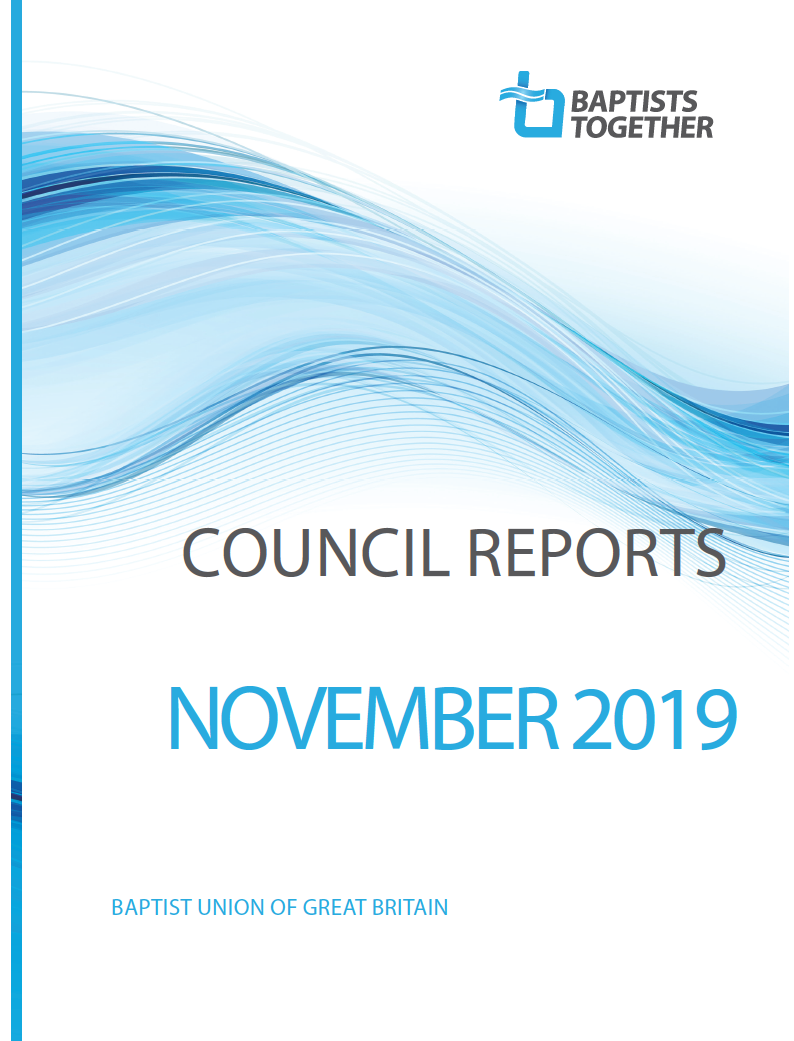 The creation of a new Movement Leadership Team and the ending of the Baptist Steering Group (BSG) was considered and voted on by Council members.
The creation of a new Movement Leadership Team and the ending of the Baptist Steering Group (BSG) was considered and voted on by Council members.
BSG was implemented as part of the recommendations of the Futures Process as the key location of organisational leadership and coordination of Baptists Together. It brings together leaders from Association Partnerships, Specialist Teams and Colleges in order to realise our vision for effective interdependent and collaborative working.
Moderator of trustees Alastair Mitchell-Baker introduced the session. He explained that Association Partnerships haven’t worked in the way they were envisaged (see November 2018 Council). This has raised questions about the composition of BSG (see March 2019 Council) – currently only around half of Association Team Leaders are on it. Furthermore, in recent years, the many conflicts of interest and loyalty that are inherent in our shared life across Baptists Together have made the work of the BSG difficult in key areas, such as finance.
There are three key reasons why a new approach was being considered, said General Secretary Lynn Green, who had prepared a paper for Council members:
-
We want to feel as one team; want to be the body of Christ in the best way we can be
-
We want to relate in ways that free us for the mission of God, and want our energies to be harnessed for the Kingdom
-
We want to be good stewards of our resources
Lynn highlighted how a book – The Underground Church by Brian Sanders – had influenced her thinking. The Underground is a network of micro-churches based in the US that collaborate together for the sake of mission. Brian provides some ‘really useful insights’ into the structural and governance issues of being a movement/family.
He coins the term, ‘dual-operating system’. We have been living with a dual-operating system for many years, said Lynn: we are an historic, grassroots family that now operates in a world of charity compliance, and our life together as Baptists is lived in both these spheres at the same time.
The key to success with a dual-operating approach, Lynn continued, ‘will be being much clearer about when we are relating as movement and when we are relating as charities.’
On the one hand, Baptists Together is a family or movement. As a collaborative peer movement/ family, we share a common DNA and purpose, and we covenant together because of that. This way of relating is focussed on organic relationships and does not get distracted by strategy and money.
On the other hand, we are a network of around 2019 distinct charities which operate locally, regionally or nationally. Each charity fulfils its appropriate legal requirements with regard to charitable objects; people, property, finance and compliance.
While ‘not a perfect solution’, having an intentional dual-operating mind-set is ‘a practical way forward’ that reflects reality and will offset a number of concerns around clarity roles of different groups and the governance relationships that we operate within.
‘With this realisation we can then be clear which sphere we are operating in and when, and employ appropriate patterns of relating to enable us to participate in God’s mission most effectively,’ Lynn said.
The proposal before Council members was therefore to experiment with a ‘Movement Leadership Team’ type gathering, which would be part of our family way of being. This would include all Regional Team Leaders, Specialist Team Leaders, College Principals, the Council and Trustee moderators, our President, Treasurer, and those who are leading key areas of work.
With such a team, BSG would be no longer needed as the national charitable responsibilities would sit with Trustees / Council / Assembly and implemented through relevant leaders and staff members.
Council members were asked to firstly discuss the principle of such a change, before exploring the detail.
They expressed a collective desire to explore the proposal (no one voted that we shouldn’t). However, there was some disagreement about when this experimentation would happen, with some members suggesting it was too quick to begin immediately. Though the vote was narrow, members decided to reflect further and make a decision about the proposal at the next Council gathering in March.
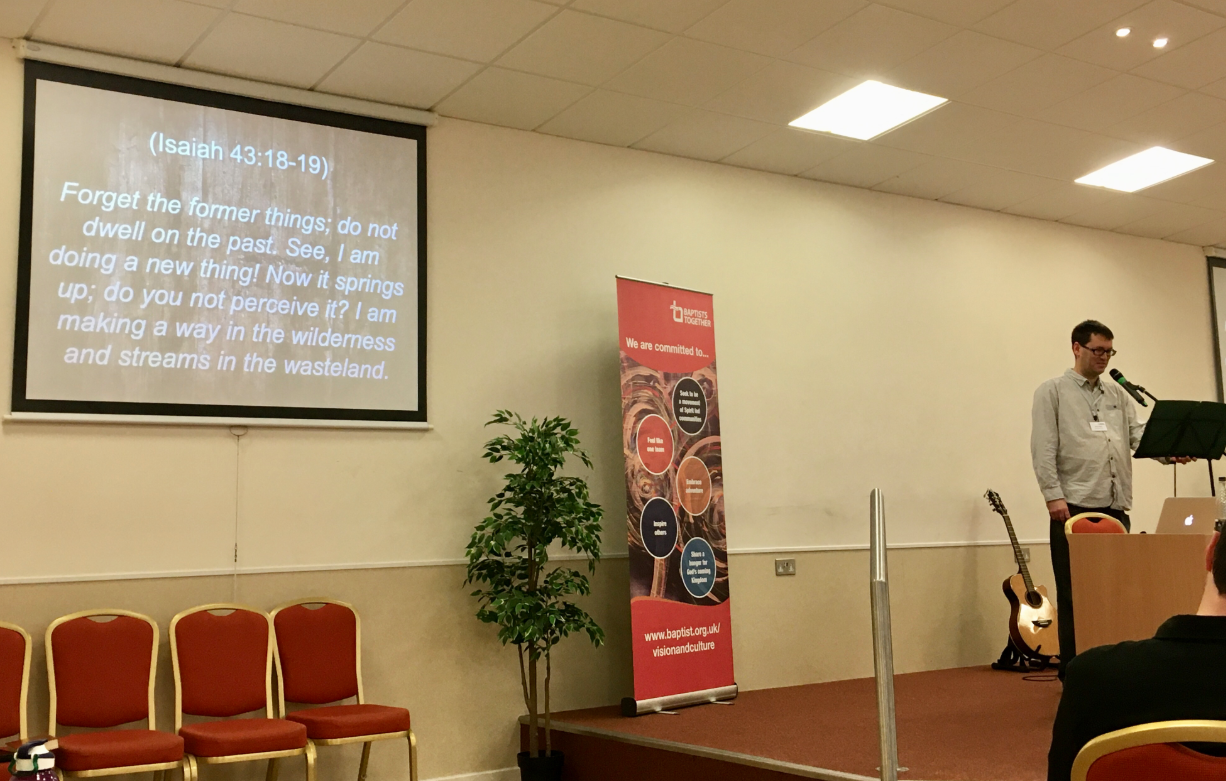
Worship was led by Steve Tinning of Leigh Road Baptist Church
New churches and closures
Eight churches which have joined our Baptist Union were welcomed, affirmed and prayed for by Council members.
The churches are:
-
Lavendon Baptist Church (CBA)
-
Glory of God Illuminated Church (CBA)
-
Countess Free Church, Ely (EBA)
-
Castle Donington Community Church (EMBA)
-
Epping Green (EBA)
-
Mytchett Baptist Church (SEBA)
-
Wellspring Baptist Church (LBA)
-
Trinity Baptist Church, Dalston (LBA)
‘We welcome and affirm them,’ said Council moderator David Mayne. ‘Let’s pray for these communities of faith. Pray for leaders of new churches, may they feel fully welcomed and embraced by new Associations.’
Council was informed that nine churches had ceased membership of our Union, and were continuing as members of other bodies, such as the Baptist Union of Wales. Several were related to a decision taken at the previous Council, when it was agreed that churches that had not paid their subscription since at least 2017 would be contacted. Some had subsequently decided that a dual membership was no longer appropriate.
‘May they grow and be blessed,’ said David.
Council members were informed that a further 21 churches have closed, a much higher number than normal. Concern about this number was expressed.
Baptists Together Key Roles Nominations Team
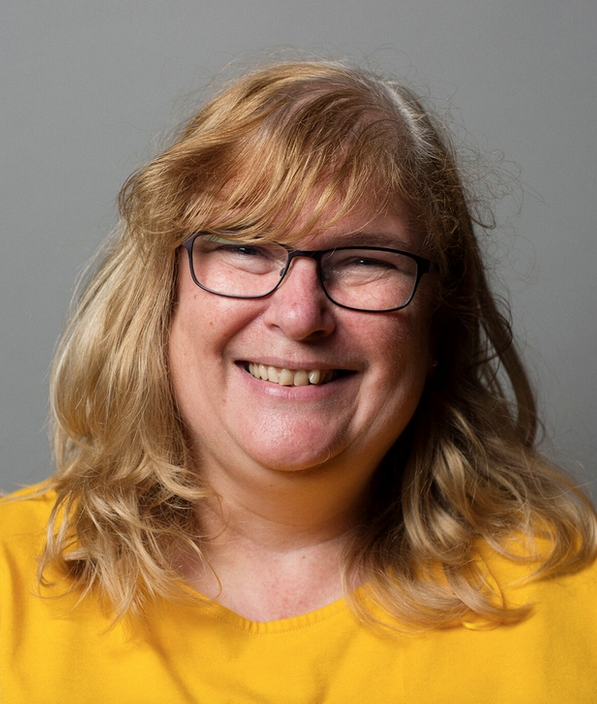 Two new people will be joining Council after their recommendation by the Baptists Together Key Roles Nominations Team was approved. They are the Revd Susan Myatt of the Open Hands Signing Church (pictured), and the Revd Raphael Amoako Atta of East Plumstead Baptist Church. Rupert Lazar, moderator of the nominations team, said both would bring their passion and commitment to the role.
Two new people will be joining Council after their recommendation by the Baptists Together Key Roles Nominations Team was approved. They are the Revd Susan Myatt of the Open Hands Signing Church (pictured), and the Revd Raphael Amoako Atta of East Plumstead Baptist Church. Rupert Lazar, moderator of the nominations team, said both would bring their passion and commitment to the role.
In his report Rupert said the team acknowledges with thanks the service of three people who will all end their terms of service at March 2020 Council: Seidel Abel Boanerges, George Ayoma and Andrew Miles.
Rupert also highlighted that in order to have a smooth handover, now is a good time to begin thinking about a successor to David Mayne, whose second three-year term as Council moderator ends in 2021. He said the team is open to ‘a creative solution’ – perhaps two moderators.
Rupert added that we are still looking for a trustee with legal and financial background.
Finance
Richard Wilson, Support Services Team Leader, gave a finance update. Home Mission giving is very similar to the corresponding figure from 2018, which means it’s below budget and is continuing to show a year on year decline in real terms. We have so far had a bad year for legacy income, in contrast to last year. Everything else is ‘more or less’ on track, said Richard. A year end deficit of £60,000 is anticipated. This is not great, continued Richard, but will be offset by last year’s small surplus.
Richard also gave a pensions update, specifically related to churches affected by a fault in the pensions regulation relating to employers with multiple cessation events. As part of the Family Solution agreed in 2018, we have a scheme to address this issue, and letters have now been sent to the 360 employers affected by the issue. The letters need to be signed, otherwise the Pension Trustee will chase them for their debt. Currently 150 letters have been signed and returned. It is anticipated this process will be substantially complete by early 2020.
Churches not paying their subscriptions
Council agreed to a proposal to terminate membership of 10 churches from our Baptist Union. Richard had reported at the March Council that 45 churches in membership of our Union had not paid their subscription since at least 2017. In line with the actions agreed at that Council, Associations were provided with the list and have helped chase down those churches in their areas. Subsequently Lynn wrote to every church to ask if they wish to remain in membership.
There are now 27 churches that have still not paid their subscriptions. Of these, Richard highlighted 10 that have either confirmed they do not wish to pay, have expressed an intent to leave Baptists Together or have not completed an annual return for a long time. Council agreed that these churches will now be contacted to say their membership has been brought to an end. They will also be informed that should they wish this to be reconsidered, they should respond and the decision could be reviewed at the next Council meeting in March 2020.
Richard added that by contacting churches in this way, we have started to re-establish relationship with some. The overall collection rate for subscriptions is well over 95 per cent.
Communications workshop
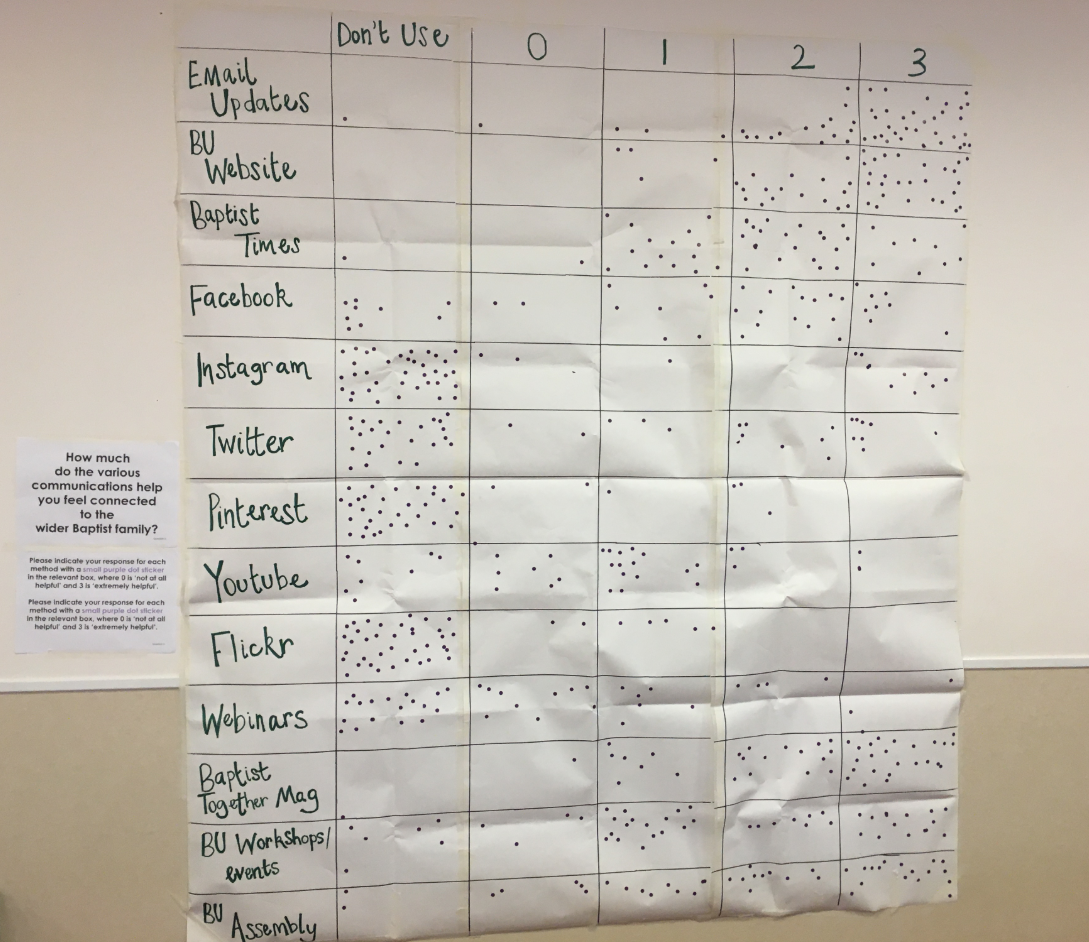 The final session at this Council was a communications workshop, led by Mike Lowe, the national communications manager. We are a Good News movement of people, explained Mike, keen to share how God is at work in our lives with a deep desire for other people to find and know God’s love for them. How we connect locally, regionally and nationally is crucial in enabling this to happen and for harnessing the power of a movement of people compelled by God’s love.
The final session at this Council was a communications workshop, led by Mike Lowe, the national communications manager. We are a Good News movement of people, explained Mike, keen to share how God is at work in our lives with a deep desire for other people to find and know God’s love for them. How we connect locally, regionally and nationally is crucial in enabling this to happen and for harnessing the power of a movement of people compelled by God’s love.
In a variety of activities he encouraged Council members to share how connected they and the people they worked with felt, which communications channels helped people feel connected with the Baptist family, and what would help people feel more connected and help communicate the Good News.
This is a season of listening, added Mike, asking the Baptist family about how they connect and communicate. There is currently a survey anyone interest is invited to complete. It takes no more than 10 minutes, and will be open until 9am, Monday 18 November. Access it here: surveymonkey.co.uk/r/natcommunications
Assembly feedback
This was the first gathering of Baptist Union Council since the Baptist Assembly in May, and plans for next year’s Assembly are well underway. However, this was still an opportunity for feedback to be sought from Council members about the 2019 event. In sheets positioned around the room, they were encouraged to share what they loved, what they would change, and ideas for the networking zone.
Ministerial recognition rules
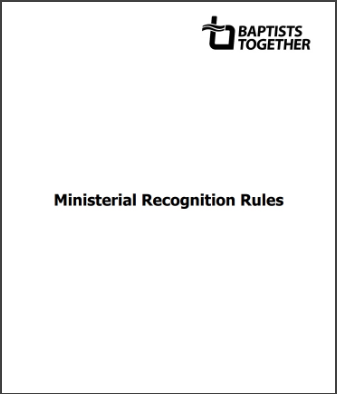 Council members approved a series of changes to the Ministerial Recognition (MR) rules. The changes had been suggested by our lawyer to close a loophole, noted Andy Hughes, Ministries Team Leader.
Council members approved a series of changes to the Ministerial Recognition (MR) rules. The changes had been suggested by our lawyer to close a loophole, noted Andy Hughes, Ministries Team Leader.
The main change relates to the removal of names from the Register following a risk assessment by the National Safeguarding Team, which concludes that a minister is unsuitable to working with children and young people, and/or adults at risk. As the rules stand the only circumstance which allows the removal of a name in these circumstances is when an enhanced disclosure reveals new information leading to an assessment. The changes ensure that all the circumstances leading to a risk assessment are included in the grounds to remove accreditation when the conclusion of the risk assessment is that the minister is unsuitable.
Register of Nationally Accredited Church Workers
The register had been established by Council in 2010, with the intention of providing recognition and accreditation for those whose primary vocational calling was as a Church Worker. Currently we only have one parish nurse and one children and family worker enrolled. In the light of such small demand and because Parish Nursing UK now provides recognition for parish nurses, the Ministerial Recognition Committee recommended that this register is closed to new entrants.
Council members agreed to close the register to new applicants. The two individuals accredited in this way will remain on the register.
Facebook live prayer event
As has been the custom for recent Council gatherings, an evening prayer session was streamed live on Facebook. Our current President Ken Benjamin and Lois Delong, a new Council member who participated in the Inspiring Leadership Programme in 2018, helped to lead the session. Prayers were focused around praying for our MPs and the upcoming election, Ken's theme "Where do we grow from here?", and for young people.
Baptist Times, 13/11/2019